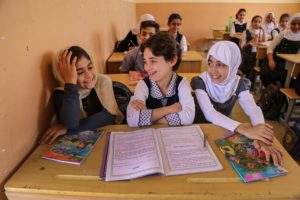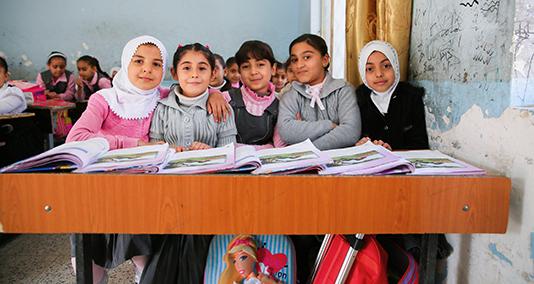
3.5 million school-aged Iraqi children are missing out on education, which means they are at increased risk of early marriage, child labour and recruitment into armed groups. One in every five schools is out use due to conflict.
UNICEF is working to get children back to learning across Iraq, including in Anbar, a Governorate that has been particularly hard hit by conflict and high levels of internal displacement.
In Anbar UNICEF and partners are refurbishing and extending school structures; providing desks, textbooks and school bags; and helping children to catch up on lost school time, as well as to reintegrate into the education system.
From January to September 2016 across Iraq UNICEF helped get more than 116,000 out-of-school children back into classrooms, installed pre-fab school structures benefitting 42,000 displaced children, and distributed school supplies and learning materials to more than 280,000 children.
UNICEF also trained more than 2,350 education staff, helped 383 schools improve their governance practices, mainstreamed life skills education in 439 schools, and helped reopen schools in previously inaccessible areas like Anbar.
UNICEF Representative in Iraq Peter Hawkins recently visited schools in Anbar province. As tens of thousands of families return to Anbar, UNICEF is rehabilitating 100 schools and in August launched a ‘Back to School’ campaign to reach about 70,000 girls, boys and families to encourage enrollment.
I visited Anbar earlier this year shortly after military operations had concluded. Ramadi city was a flat concrete pancake; the way of life had been destroyed. There was nobody there, not a single person, cat or dog, nothing living.
Six months later, in early November, I returned and, although still badly damaged, Anbar was full of hope. Schools have re-started. Children are back in the classroom devoting themselves to their studies. They and their teachers are at the vanguard of a movement giving life back to the city.
I went to four schools. There are so many children that schools run in two daily shifts to accommodate them.
Anbar is still badly damaged and it will take decades fully to restore, and yet, six months later, through small grants and maintenance, schools are being patched up. Staff have fixed windows and filled holes in walls. The enthusiasm of teachers and the resilience of children is phenomenal.
Girls and boys are back to learning, many after a two-year absence. They still want to become doctors, engineers and footballers, thirsty to create rich and meaningful lives.
In one classroom I asked students who their favourite teacher was—and they all immediately pointed at the teacher in front of them. She was overwhelmed. We need to praise these teachers all the time. So many have returned from other parts of the country when they could have easily stayed away and lived a more comfortable life. Yet they’re back. They need the support of their communities and of UNICEF.
If we are not careful, the system will fail these children.
I hope that won’t happen, and I’m encouraged by what I saw in Anbar.
It’s UNICEF’s priority to invest in education; whether it’s catch-up classes, providing materials such as desks, tents, or prefab buildings; whether it’s fixing damaged schools or training teachers in life skills or raising the esteem in which teachers are held, we’ll do whatever it takes.
We will match the dedication and generosity that Iraqis have shown. Because when you see the sheer amount of devastation you realize it would be so easy to leave, to just walk away. But the people I met that day were staying put.
As a result, schools are flourishing islands of optimism in a sea of rubble.
I’ll never forget arriving at one school. It was almost dark, it was dusty, tangled telephone wires twisted above us, and there was damage as far as the eye could see; an apocalyptic wasteland in many ways. There was almost nothing to show children that humanity exists.
And yet there were about 100 children lined up, waiting for school to start. So determined were they to learn, they had arrived a good hour before class started.
(*) Peter Hawkins is the UNICEF Representative in Iraq
Source: UNICEF Blog, 22 November 2016
https://blogs.unicef.org/blog/anbar-schools/








Comment here